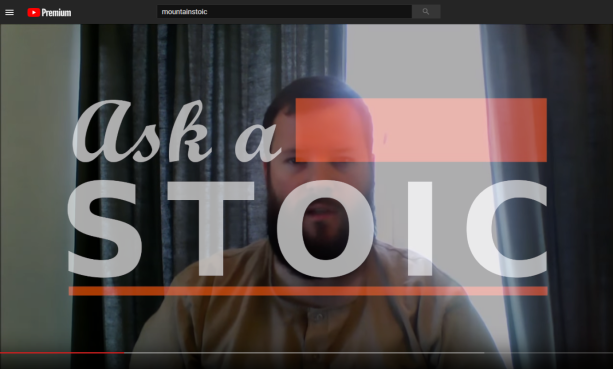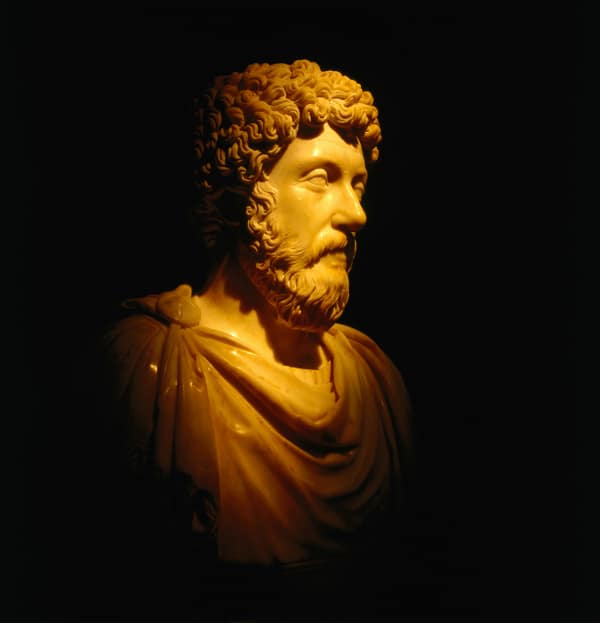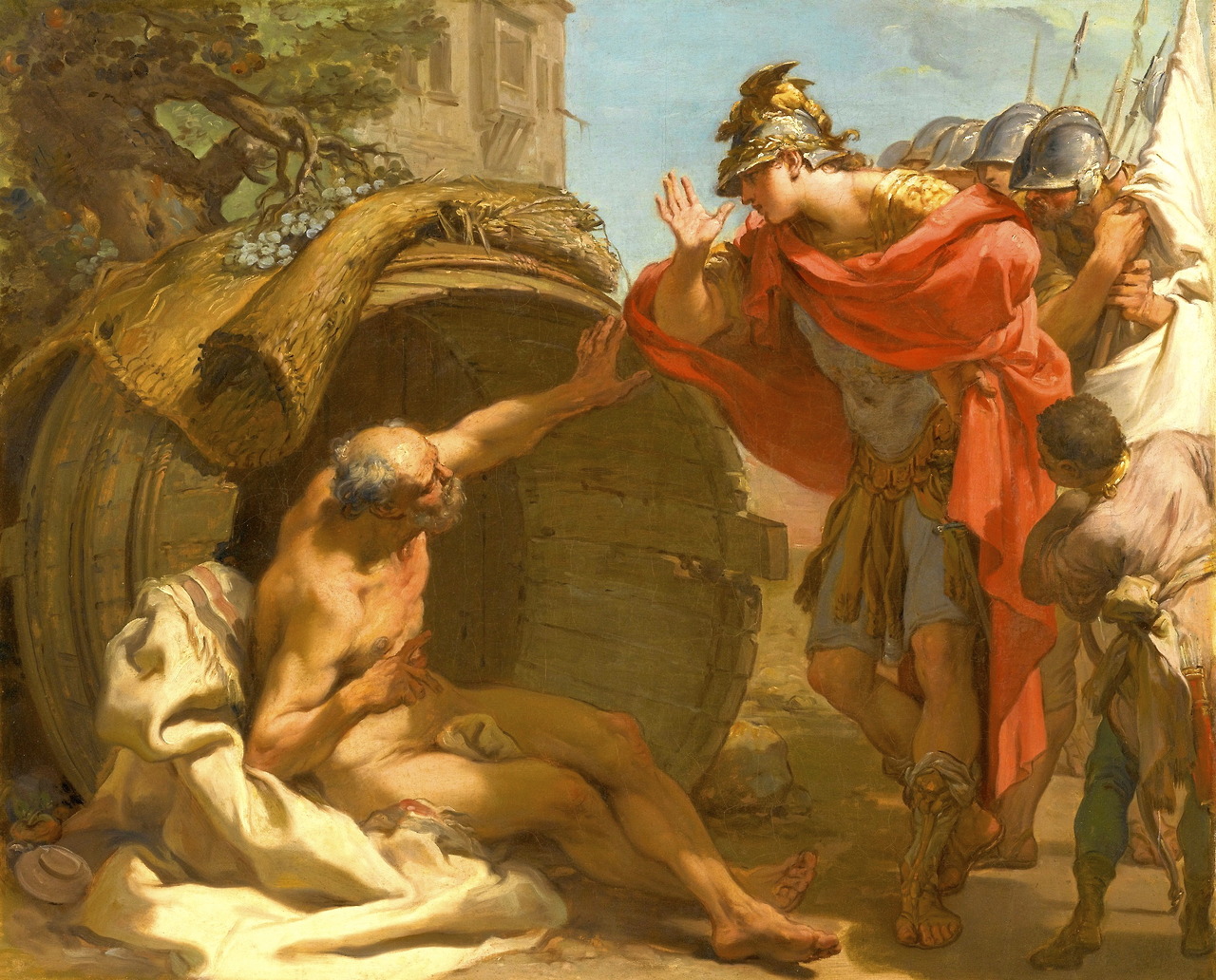I was pursuing a discussion in the Traditional Stoicism group on FB, (probably the highest level discussion on FB) when I came across a comment on ἀταραξία. There is a common trope I see in online Stoic circles that ἀταραξία is Epicurean, and ἀπάθεια is Stoic. While it is true that these words connote roughly into the two camps, it’s not as if one has unilateral claim versus the other. Epictetus uses the word ἀταραξία at least twice (that I could quickly find at the speed of online discussions).
Discourses 2, Chapter 1, Line 21.
τίς οὖν τούτων τῶν δογμάτων καρπός; ὅνπερ δεῖ κάλλιστόν τ᾽ εἶναι καὶ πρεπωδέστατον τοῖς τῷ ὄντι παιδευομένοις, ἀταραξία ἀφοβία ἐλευθερία.
What then is the fruit of these opinions? It is that which ought to be the most noble and the most becoming to those who are really educated, release from perturbation, release from fear, freedom.Enchiridion 12
… ἄρξαι τοιγαροῦν ἀπὸ τῶν σμικρῶν. ἐκχεῖται τὸ ἐλάδιον, κλέπτεται τὸ οἰνάριον: ἐπίλεγε ὅτι ‘τοσούτου πωλεῖται ἀπάθεια, τοσούτου ἀταραξία:’ προῖκα δὲ οὐδὲν περιγίνεται. ὅταν δὲ καλῇς τὸν παῖδα, ἐνθυμοῦ, ὅτι δύναται μὴ ὑπακοῦσαι καὶ ὑπακούσας μηδὲν ποιῆσαι ὧν θέλεις: ἀλλ᾽ οὐχ οὕτως ἐστὶν αὐτῷ καλῶς, ἵνα ἐπ᾽ ἐκείνῳ ᾖ τὸ σὲ μὴ ταραχθῆναι.
… Begin then from little things. Is the oil spilled? Is a little wine stolen? Say on the occasion, at such price is sold freedom from perturbation; at such price is sold tranquillity, but nothing is got for nothing. And when you call your slave, consider that it is possible that he does not hear; and if he does hear, that he will do nothing which you wish. But matters are not so well with him, but altogether well with you, that it should be in his power for you to be not disturbed.
In the second instance, we see both ἀπάθεια and ἀταραξία used in the same example.
Do not take this to mean that when we see people in modern Stoic circles pandering for a Stoicism-lite, a reductionist model which excises the very foundation of the school, that such is correct. I think it is not. However, the test cannot be the mere usage of this word, as the classical Stoics used it to. While it may be the states goal of Epicureans, it is merely a consequence of the telos of Stoicism.
I find words, etymologies, and the like interesting. I’m a fairly verbal processor. At what might seem a contrary idea, I would not get hung up on whether this term is Epicurean and that one Stoic, or Pyrrhonic, or whatever. Understanding the ideas, why one in fact is a cause of the other, is far more important. We talk with some regularity, that philosophy begins with teaching the newcomer not to be overly swayed by apparently negative things. It’s only later that we have to pivot, and discuss the apparently positive ones too. So we might need to speak to ἀταραξία before we do ἀπάθεια. That fits.
Either way, I hope that this brief discussion helps, and makes the jargon of the garden a little less bristly.


 I’ve had experience using several prayer/meditation aids in the past from several traditions, some I’ve studied as an adult and one was a core practice of my religious upbringing. It is interesting how it seems we often circle back to core parts of our early indoctrination, even if other core parts are set aside. I’ve had the opportunity to sit as a neutral observer in related services and religious functions, and I’m always struck by how far away my path has taken me from some of those concepts and beliefs, and how close others still are.
I’ve had experience using several prayer/meditation aids in the past from several traditions, some I’ve studied as an adult and one was a core practice of my religious upbringing. It is interesting how it seems we often circle back to core parts of our early indoctrination, even if other core parts are set aside. I’ve had the opportunity to sit as a neutral observer in related services and religious functions, and I’m always struck by how far away my path has taken me from some of those concepts and beliefs, and how close others still are. Recently, I discovered a tool used to pass the time in Greece and Cyprus called κομπολόι (kompoloi). These are used in a “quiet” and “loud” fashion as a sort of “fidget-device” and are really devoid of any current meditative or religious practice.
Recently, I discovered a tool used to pass the time in Greece and Cyprus called κομπολόι (kompoloi). These are used in a “quiet” and “loud” fashion as a sort of “fidget-device” and are really devoid of any current meditative or religious practice.

 I think I may have finally identified why I feel this way about money and philosophy. (I stress “finally” because this post has been a half-written draft for quite literally more than three years. WordPress tells me this is the 16th revision.)
I think I may have finally identified why I feel this way about money and philosophy. (I stress “finally” because this post has been a half-written draft for quite literally more than three years. WordPress tells me this is the 16th revision.) This doesn’t work all the time, obviously. We have scandals and crimes in the east and west over sexual assault, misappropriation of funds, and other awful crimes. Oftentimes, the organizations become so large and powerful despite this, that they can protect the criminals from justice. We even have organizations posing as religious institutions to leverage the space we’ve carved out for them. That’s also not good. Historically, the Roman Church was a government in Europe, and the Orthodox Church in Greece today leverages a lot of influence in the government of that country. So again, not perfect.
This doesn’t work all the time, obviously. We have scandals and crimes in the east and west over sexual assault, misappropriation of funds, and other awful crimes. Oftentimes, the organizations become so large and powerful despite this, that they can protect the criminals from justice. We even have organizations posing as religious institutions to leverage the space we’ve carved out for them. That’s also not good. Historically, the Roman Church was a government in Europe, and the Orthodox Church in Greece today leverages a lot of influence in the government of that country. So again, not perfect. Longtime readers will remember that
Longtime readers will remember that 

 Navia posits, contra most others, that above all Diogenes’ actions and mode of life are an act of love. A love of people, particularly. Many others see the man’s reported actions, demagogue-like haranguing, and lewd activities as a repudiation of humankind. Navis says no, this cannot be the case. If Diogenes were a misanthrope, he would reasonable retreat to the wilderness, live howsoever he chose, and quietly pass his life in solitude. This is not the only reason to seek retreat, clearly, but this is the argument as I’ve seen it.
Navia posits, contra most others, that above all Diogenes’ actions and mode of life are an act of love. A love of people, particularly. Many others see the man’s reported actions, demagogue-like haranguing, and lewd activities as a repudiation of humankind. Navis says no, this cannot be the case. If Diogenes were a misanthrope, he would reasonable retreat to the wilderness, live howsoever he chose, and quietly pass his life in solitude. This is not the only reason to seek retreat, clearly, but this is the argument as I’ve seen it. xtremism of Cynic living is a pedagogical tool, and not the direct advice for the people. I’m not so sure I agree with him on this point, however. He says that much like the
xtremism of Cynic living is a pedagogical tool, and not the direct advice for the people. I’m not so sure I agree with him on this point, however. He says that much like the
You must be logged in to post a comment.